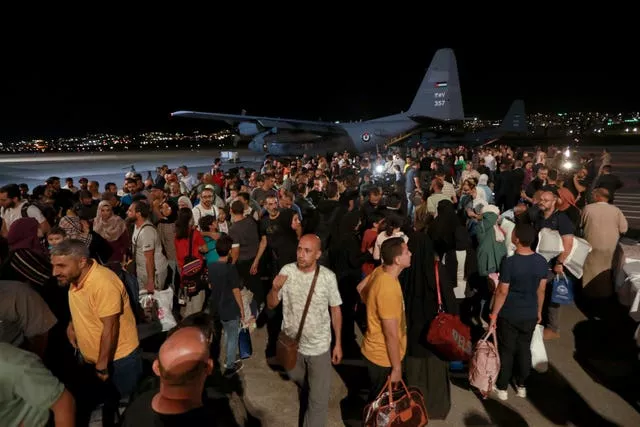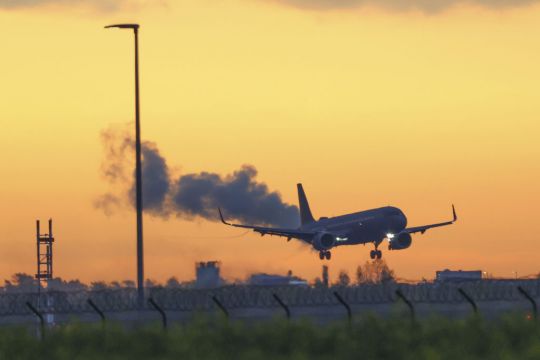As foreign governments airlifted hundreds of their diplomats and other citizens to safety, Sudanese have desperately sought ways to escape the chaos, fearing that the country’s two rival generals will escalate their all-out battle for power once evacuations are completed.
In dramatic evacuation operations, convoys of foreign diplomats, teachers, students, workers and families from dozens of countries wound past combatants at tense front lines in the capital Khartoum to reach extraction points.
Others drove hundreds of miles to the country’s east coast.
A stream of European, Middle East, African and Asian military aircraft flew in all day Sunday and Monday to ferry them out.
If you are a British national in Sudan, we advise you to register your presence to receive updates from the FCDO.
You should also stay up to date with the FCDO Travel Advice by signing up to e-mail alerts.Advertisement— Foreign, Commonwealth & Development Office (@FCDOGovUK) April 21, 2023
But for many Sudanese, the airlift was a terrifying sign that international powers, after failing repeatedly to broker ceasefires, only expect a worsening of the fighting that has already pushed the population into disaster.
US secretary of state Antony Blinken said he had helped broker a 72-hour ceasefire to begin late on Monday.
It would extend a nominal truce that has done little to stop the fighting but helped facilitate the evacuations.
UN secretary-general Antonio Guterres meanwhile warned of a “catastrophic conflagration” that could engulf the whole region.
He urged the 15 members of the Security Council to “exert maximum leverage” on both sides in order to “pull Sudan back from the edge of the abyss”.
Sudanese face a harrowing search for safety in the constantly shifting battle of explosions, gunfire and armed fighters looting shops and homes.
Many have been huddling in their homes for nine days.
Food and fuel are leaping in price and harder to find, electricity and internet are cut off in much of the country, and hospitals are near collapse.

Those who can afford it were making the 15-hour long drive to the Egyptian border or to Port Sudan on the Red Sea coast.
Those without means to get abroad streamed out to relatively calmer provinces along the Nile north and south of Khartoum.
Many more were trapped, with cash in short supply and transport costs spiralling.
“Travelling out of Khartoum has become a luxury,” said Shahin al-Sherif, a high school teacher.
The 27-year-old was frantically trying to arrange transport out of Khartoum for himself, his younger sister, mother, aunt and grandmother.
They had been trapped for days in their home in Khartoum’s Amarat neighbourhood while fighting raged outside.
Finally, they moved to a safer district farther out.
But Mr al-Sherif expects things to get worse and worries his sister, aunt and grandmother, all diabetic, will not be able to get the supplies they need.

Bus ticket prices have more than quadrupled so that renting a bus for 50 people to get to the Egyptian border costs around 14,000 dollars (£11,200), he said.
Amani el-Taweel, an Egyptian expert on Africa, warned of “horrific suffering” for Sudanese unable to leave.
In a country where a third of the population already needed humanitarian aid, aid agencies can no longer reach most Sudanese because of the clashes.
Once evacuations are complete, “warring parties will not heed any calls for a truce or a ceasefire”, she said.
Heavy gunfire and thundering explosions rocked the city in continued fighting between the military and a rival paramilitary group called the Rapid Support Forces.
In the afternoon, intensified air strikes hammered Khartoum’s Nile-side Kalakla district for an hour until the area was “razed to the ground”, said Atiya Abdulla Atiya, secretary of the Doctors’ Syndicate.
The bombardment sent dozens of wounded to the Turkish Hospital, one of the few medical facilities still functioning, he said.
Egypt’s Foreign Ministry, meanwhile, said an administrator at its Khartoum embassy was killed on his way to work to help oversee the evacuations, without saying who was responsible.
“We are working across government and with our friends and partners internationally to do everything we can to keep British nationals safe.”
Foreign Secretary @JamesCleverly gives an update from the FCDO Crisis Response Centre on the situation in Sudan ⬇️ pic.twitter.com/PR4DLMfnrF— Foreign, Commonwealth & Development Office (@FCDOGovUK) April 23, 2023
Cairo has close ties to the Sudanese army but has joined calls for a ceasefire.
Earlier, Egypt had denied any of its embassy staff were harmed after the Sudanese military reported that one had been killed, blaming the RSF.
More than 420 people, including at least 273 civilians, have been killed and over 3,700 wounded since the fighting began April 15.
The military has appeared to have the upper hand in fighting in Khartoum but the RSF still controls many districts in the capital and the neighbouring city of Omdurman, and has several large strongholds around the country.







